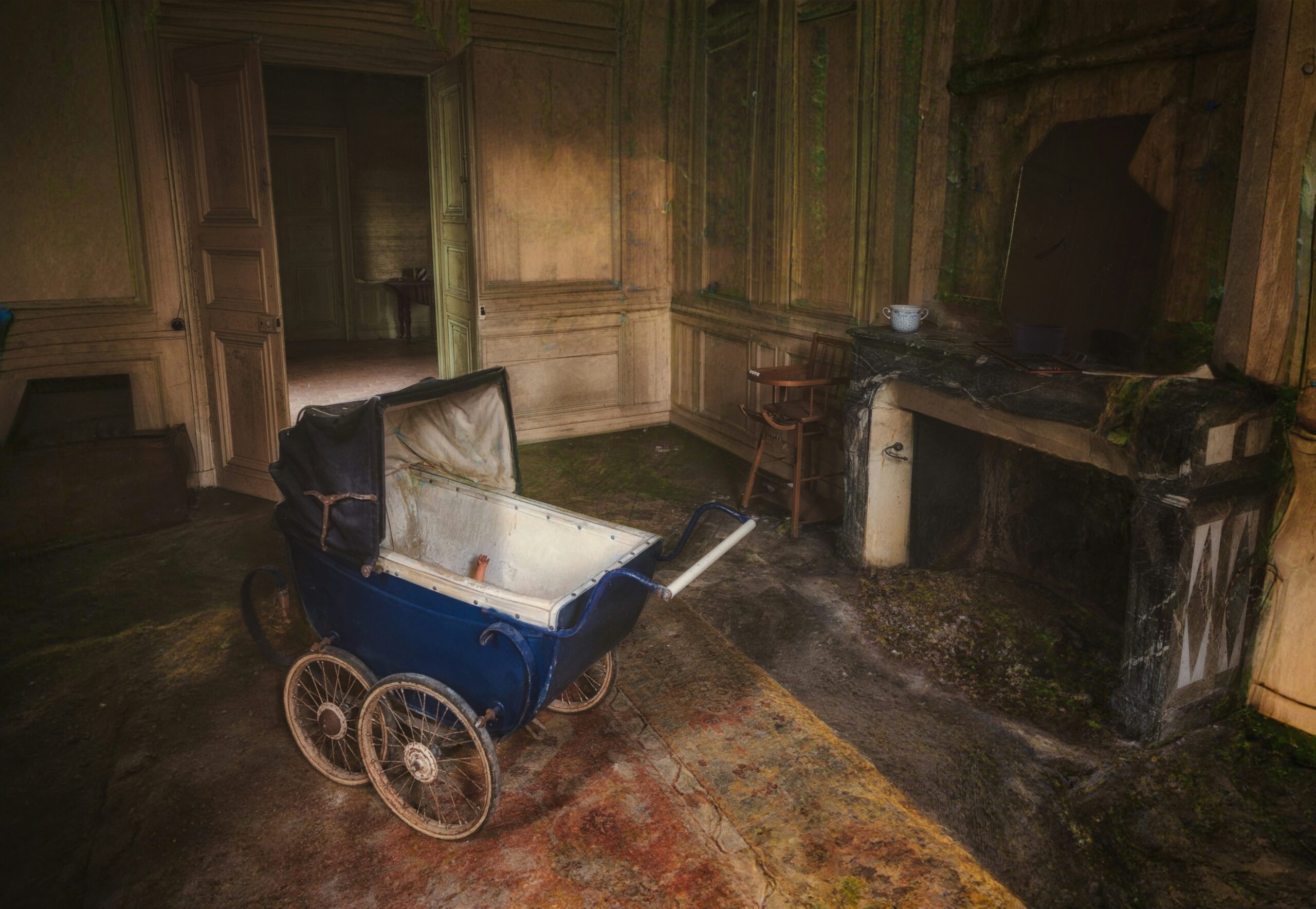I slink down the street, rotting tot in stroller. Each clack of the wheels on the sidewalk cracks becomes a twist inside my chest.
Squeals ringing from the playground. Ladies on benches in neat dresses, reading or chatting or watching kids play. I sit on a bench, soaking up all the happy around me.
Wendy? Wendy Rhys?
Whatever happy seeped in gushes out.
It IS you!
I smile at Rhonda, who is jogging through the park in yoga pants and a sports bra. This is the first time we’ve seen each other outside of Claremont High, where we teach. We’re both on maternity leave.
Her stomach is flat, tight, and immaculate.
Rhonda wipes the sweat off her forehead. And this must be Oscar? She bends down, peering inside my stroller.
My baby’s skin is sunken and soupy green, jaw hanging down to the side—tongue shriveled like something pickled inside a dark jar.
He has your eyes, that’s for sure. Rhonda winks at me. My little Norah has her father’s. She looks back to the playground. In the sandbox, her husband and a few children help her baby build a small sandcastle. The baby bounces her pudgy arms up and down, giggling.
I wish all their children were corpses, too.
Some nights I can’t sleep, just thinking about it all. The hours of sweat and writhing and feeling like something shredded. Our baby dusted blue (so soft and light, like a flower) passed from doctor to nurse to my husband Dale like a wilted petal drifting in the wind. Myself howling.
How they all cooed over the body and then stared back at me, confused.
Other nights I listen to the waves of Dale’s snores and do what I’ve done since I was a teenager, and imagine what my Wikipedia article might say: Wendy Rhys—award winning American poet—one of the brightest minds of her generation—gained a cult following—influenced writers and artists throughout the world—loving wife and mother.
For those first few nights, I stayed up researching anything I could think of. Depression. Hallucinations. Schizophrenia. Alternate realities glitching into our universe, alien abductions and their elaborate experiments. Changelings.
But none of it ever made any sense. And everyone adored Oscar.
So I stopped.
Back home, I check the mail. Three envelopes: a rejection slip from a local literary arts journal with a yellow stain and a note saying BETTER LUCK NEXT TIME, a Hallmark card some substitute teacher forced my second-grade students to sign, and another rejection slip, but this time from my health insurance provider claiming my emergency cesarean section was medically unnecessary.
Later, I’m chopping oddly named veggies and fruits to make another batch of bitter smoothies, watching TV. The breast pump hums. On TV, a young environmental activist scolds world leaders at the United Nations, more reruns of sitcoms, competitive reality shows. In the corner of my eyes, Oscar crammed into his baby walker. His stiff limbs made it almost impossible to dress him in this orange Grandma’s Little Pumpkin onesie my mother-in-law had sent, and desperately needed a picture of him in. She made it her profile picture. Lots of likes, no comments about the red seeping through the cloth.
Suddenly, the front door swings open. Dale stumbles in. He looks around wildly, then groans when he sees me.
Fuck’s sake, Wendy, I thought something was wrong. He takes off his shoes, hangs up his coat. I could hear him from the driveway. How long has he been crying?
Oh. I stop chopping, wipe my hands with a towel. I unscrew the bottle from the breast pump and pull the baby walker towards me. He’s just hungry. I hold the bottle up, rest the silicone nipple on Oscar’s clamped, shrunken lips. See? All better.
Dale doesn’t respond. He walks over and places his hand on my shoulder, gently rubbing it.
Should I call the doctor again?
If you want.
Do you?
I don’t say anything. He bends down and kisses the top of my head. I don’t have to look up to know that his eyes are worried, his glasses are smudged, and his breath reeks of the milkshake and fries he always sneak-eats in the car on his drive home from work.
Out the window, a sunset like some cheap cliché framed on the wall.
/ / /
Months pass. I go back to work. I try to explain how cells are the building blocks of life, how Shakespeare was a radical who invented words like zany and dawn—Isn’t that cool?!—and my students gawk at the clock behind me.
Dale gets home later and later from work, and we stop eating dinner together. We hire a babysitter. The babysitter reads fairy tales to Oscar, and she tells me The Ugly Duckling seems to be his favorite. Only ten months old, and apparently he’s quite the babbler.
By the time school closes and summer arrives, the babysitter is gone.
I don’t know how much longer I can keep doing this.
So today I’m treating myself. I go to Old Crow’s Bookstore. I leave Oscar buckled inside his car seat. He’s long past wilting, now melting. Nails fallen out, eyes gooey black. Somehow, I’ve gotten used to the smell.
Inside, roaming the aisles, I pick out and skim a short story collection, reading the first few sentences from each story like a kid who samples each flavor in an ice cream shop. I try to connect to the words, but they’re bland—until I find a simile about a moon dangling in a girl’s bedroom window like a scythe, and I feel inspired.
I’m walking up to the counter when I notice the lavender papers in everyone’s hands. I had seen some in a stand by the front door that I ignored, and now there’s a stack by the register. I take one.
It’s a flier for an upcoming book signing—THE JOYS OF MOTHERHOOD—a debut poetry collection—some local teacher (recently published in The New Yorker) named Rhon—
I freeze. Cannot breathe. Stumble back. Knees buckling as I sink into a nearby sofa.
Time zips on. Patrons fly by. Through the window, I see the sun flicker between clouds. The quiet buzzes like flies. Pulsing. Crushing. A rhythm shredded to bits.
Ma’am!
Someone shaking my shoulder. An old woman. Pointing out the window. To my car. Eyes bulging.
Ma’am! Is that your car? Your child—
Everything’s fine!
I fling myself off the sofa. Dash out of Old Crow’s Bookstore.
A man is trying to punch through the backseat window of my car. Seeing me approach, he stops. Starts yelling. Before he even reaches the driver’s side, I’ve jumped inside and twisted my keys into the ignition.
Everything’s fine!
I stomp on the gas pedal, running over his foot and driving away.
At the park. On a bench. Ignoring the gnats swarming the stroller.
Broken.
When suddenly I see a woman pass by me carrying a small skeleton.
I’m so shocked I can’t move, but as she gets farther away, I jolt up, grab my stroller, and rush towards her until I match her pace, walking beside her.
Good morning, I say.
She turns to me. G’mornin. She doesn’t return my smile. Then she glances down towards Oscar, and her eyes go wide.
For a moment, we each stop walking and look at each other.
You, too? I mumble.
Instantl,y she starts walking away
Wait! I shout, following her. She walks faster and faster. So do I.
Now we’re sprinting. My stroller rattles and wobbles through the gravel of the adjacent parking lot we’ve careened into. The tiny arms and legs of the skeleton she carries flail over her shoulder as she hurries away. She’s heading towards a van.
Please! I shout again. Just talk to me? I don’t know how to fix this!
She slows her pace, and finally, I’ve caught up with her.
And I do?! she barks.
Like a child, I start crying.
Oh, Lord. She looks again towards Oscar, then back at me. You’re a new mother?
I nod. Wipe the tears off my face. His name is Oscar.
Lily, she says, nodding towards the small skeleton in her arms. For the first time, I notice it’s wearing overalls and a MAY THE FORCE BE WITH YOU T-shirt.
How old? I ask.
Year and a half.
I almost start crying again. Does anyone ever understand? Does anything ever get better?
She sighs. It gets easier. Nothing will ever be the same, but it gets easier.
But how? Why me? Why him? I bend down toward Oscar, touch the tips of his crooked fingers. Lips thinned into nothing, gums black and retracted, he bares rotten teeth like yellowed dentures. It’s not fair.
None of it’s fair. But you survive.
But how?
You’ll find your way, she says. You’ll learn to see what they see. She unlocks her van and tosses Lily into the trunk. We all do.




